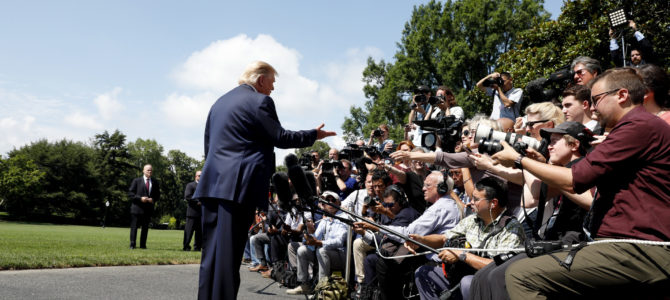Trump White House Official Kash Patel filed a libel suit on Monday against Politico and one of its reporters for stories and tweets he claims falsely accuse him of “lying, deceit, and unethical conduct,” according to a Fox News report.
Patel, who currently serves as the National Security Council’s senior counterterrorism director, is seeking $25 million in damages. Patel’s suit directly names both Politico owner Robert Allbritton and Natasha Bertrand, a Politico reporter and MSNBC Contributor.
Patel claims the defendants “acted in concert” with Rep. Adam Schiff, D-Calif., with the alleged aim of “destroy[ing] Kash’s reputation” in order to buttress “Schiff’s baseless Ukrainian quid pro quo hoax.” The articles in question, both penned by Bertrand, include one from October 23, titled “Nunes Protégé Fed Ukraine Info to Trump,” and another from October 30, titled “Testimony: Nunes acolyte misrepresented himself to Trump as Ukraine expert.”
At the center of the reporting is the contention that Patel, formerly an aide for Rep. Devin Nunes, R-Calif., during the Intel Committee’s Russia investigation, was feeding President Trump damaging information on Ukraine. Bertrand reported in her October 23 piece that Patel “was among those passing negative information about Ukraine to President Donald Trump earlier this year, fueling the president’s belief that Ukraine was brimming with corruption and interfered in the 2016 election on behalf of Democrats.”
She further elaborated that, “Patel’s involvement demonstrates that the president had at least some support for the scheme from within the NSC,” usage of the word “scheme” seemingly indicating that whatever Trump had devised in relation to Ukraine was nefarious and Patel was distinctly involved. It also seems to establish a direct link between the Democrats’ allegations of a quid pro quo and the upper echelons of the national security apparatus.
In her October 30 piece, Bertrand reports that Patel, who was allegedly a critical voice on Ukraine, had nonetheless “misrepresented” himself as an expert on the country, to the point that President Trump mistakenly regarded him as the “NSC’s top Ukraine expert instead of Vindman.” In the same piece, Bertrand admitted, in reference to “negative material on Ukraine,” “It’s still not clear what materials Patel was giving Trump, or where he was getting them.”
But, Patel alleges, this specific stream of communication between Patel and Trump that Bertrand reported never actually took place. Patel states in his suit, “at no time” prior to October 30 “had Kash ever communicated with the president on any matters involving Ukraine. Kash never supplied any Ukraine ‘materials’ to the president.”
Bertrand’s reporting was derived from leaked accounts of the closed-door testimonies of both former NSC senior director Fiona Hill and the NSC’s Ukraine director Lt. Col. Alexander Vindman. Patel argues in his suit that neither Hill nor Vindman presented direct evidence that he actually briefed President Trump on Ukraine. This argument is confirmed from reading the later-released testimonies of both Hill and Vindman.
Indeed, from her testimony, it appears that Hill arrived at the conclusion that Patel was sending materials to President Trump based on a single “very brief interaction with the Executive Secretary,” which she later states was a staff member of the Executive Secretary and the interaction in question was “just an aside.” According to Hill, the staffer had stated that the President had wanted to set up a meeting with the NSC’s Ukraine director “to talk about some of the materials” and said that he or she would thus “be reaching out to Kash.” From Hill’s recounting, it seems no mention was made of whether Kash had sent the materials.
Furthermore, Hill declared she didn’t know “what kind of materials” and when questioned if she ever saw such materials, Hill responded, “I did not.” When questioned if she ever learned what materials Patel was passing along to President Trump, she responded, “I did not.” She did not follow up after reporting her concerns to Deputy National Security Advisor Charlie Kupperman.
Additionally, as revealed from Vindman’s testimony, Vindman had no firsthand knowledge of Patel’s relationship with Trump and only knew of the alleged “misrepresentation” through Hill.
Thus, at the base of Patel’s lawsuit is the notion that leaks may be dangerous for outlets that indiscriminately report on them before official sources are released. Patel’s suit argues that if Politico “had bothered to wait for the transcript, they would have learned that Hill completely fabricated the story that Kash had provided ‘materials on Ukraine’ to the president.” In the very least, waiting until the release of the transcripts would have thrown the veracity of Hill’s suspicions into a much more critical light.
While libel suits are traditionally difficult to win—and even more difficult if the individual suing is deemed a “public figure”—Patel’s lawsuit nonetheless shows that breathlessly publishing leaks, likely originating from partisan figures, may incur tangible costs, even if those costs are only to one’s reputation. Americans are growing increasingly distrustful of the media, and it’s not difficult to figure out why.
Patel’s lawsuit, regardless of the outcome, will likely strike many as a cathartic balm to the impeachment inquiry circus, which has been a frustrating confluence of closed-door hearings and seemingly selective “leaks.” As the ringleader of the circus, Adam Schiff is an additional target of Patel’s suit, Patel labeling the California representative “a demagogue with an ax to grind against the president.”
Thus, this lawsuit is not only about condemning establishment media but also about, as Howard Kurtz of Fox News points out, “put[ting] Adam Schiff’s handling of the impeachment inquiry itself on trial.” Whatever the outcome, it’s increasingly apparent that leaks have consequences.








